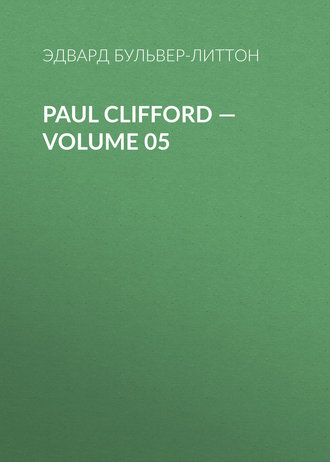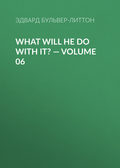
Эдвард Бульвер-Литтон
Paul Clifford — Volume 05
The footman who had apprised the squire of this misfortune was, unlike most news-tellers, the first to offer consolation. "There be an excellent public," quoth he, "about a half a mile on, where your honour could get horses; or, mayhap, if Miss Lucy, poor heart, be faint, you may like to stop for the night."
Though a walk of half a mile in a dark night and under other circumstances would not have seemed a grateful proposition, yet at present, when the squire's imagination had only pictured to him the alternatives of passing the night in the carriage or of crawling on foot to Bath, it seemed but a very insignificant hardship; and tucking his daughter's arm under his own, while in a kind voice he told Clifford "to support her on the other side," the squire ordered the footman to lead the way with Clifford's horse, and the coachman to follow or be d—-d, whichever he pleased.
In silence Clifford offered his arm to Lucy, and silently she accepted the courtesy. The squire was the only talker; and the theme he chose was not ungrateful to Lucy, for it was the praise of her lover. But Clifford scarcely listened, for a thousand thoughts and feelings contested within him; and the light touch of Lucy's hand upon his arm would alone have been sufficient to distract and confuse his attention. The darkness of the night, the late excitement, the stolen kiss that still glowed upon his lips, the remembrance of Lucy's flattering agitation in the scene with her at Lord Mauleverer's, the yet warmer one of that unconscious embrace, which still tingled through every nerve of his frame, all conspired with the delicious emotion which he now experienced at her presence and her contact to intoxicate and inflame him. Oh, those burning moments in love, when romance has just mellowed into passion, and without losing anything of its luxurious vagueness mingles the enthusiasm of its dreams with the ardent desires of reality and earth! That is the exact time when love has reached its highest point,—when all feelings, all thoughts, the whole soul, and the whole mind, are seized and engrossed,—when every difficulty weighed in the opposite scale seems lighter than dust,—when to renounce the object beloved is the most deadly and lasting sacrifice,—and when in so many breasts, where honour, conscience, virtue, are far stronger than we can believe them ever to have been in a criminal like Clifford, honour, conscience, virtue, have perished at once and suddenly into ashes before that mighty and irresistible fire.
The servant, who had had previous opportunities of ascertaining the topography of the "public" of which he spake, and who was perhaps tolerably reconciled to his late terror in the anticipation of renewing his intimacy with "the spirits of the past," now directed the attention of our travellers to a small inn just before them. Mine host had not yet retired to repose, and it was not necessary to knock twice before the door was opened.
A bright fire, an officious landlady, a commiserate landlord, a warm potation, and the promise of excellent beds, all appeared to our squire to make ample amends for the intelligence that the inn was not licensed to let post-horses; and mine host having promised forthwith to send two stout fellows, a rope, and a cart-horse to bring the carriage under shelter (for the squire valued the vehicle because it was twenty years old), and moreover to have the harness repaired, and the horses ready by an early hour the next day, the good humour of Mr. Brandon rose into positive hilarity. Lucy retired under the auspices of the landlady to bed; and the squire having drunk a bowl of bishop, and discovered a thousand new virtues in Clifford, especially that of never interrupting a good story, clapped the captain on the shoulder, and making him promise not to leave the inn till he had seen him again, withdrew also to the repose of his pillow. Clifford remained below, gazing abstractedly on the fire for some time afterwards; nor was it till the drowsy chambermaid had thrice informed him of the prepared comforts of his bed, that he adjourned to his chamber. Even then it seems that sleep did not visit his eyelids; for a wealthy grazier, who lay in the room below, complained bitterly the next morning of some person walking overhead "in all manner of strides, just for all the world like a happarition in boots."
CHAPTER XXIII
Viola. And dost thou love me?
Lysander. . . . Love thee, Viola? Do I not fly thee when my being drinks Light from thine eyes?—that flight is all my answer!
The Bride, Act ii. sc. 1.
The curtain meditations of the squire had not been without the produce of a resolve. His warm heart at once reopened to the liking he had formerly conceived for Clifford; he longed for an opportunity to atone for his past unkindness, and to testify his present gratitude; moreover, he felt at once indignant at, and ashamed of, his late conduct in joining the popular, and, as he now fully believed, the causeless prepossession against his young friend, and before a more present and a stronger sentiment his habitual deference for his brother's counsels faded easily away. Coupled with these favourable feelings towards Clifford were his sagacious suspicions, or rather certainty, of Lucy's attachment to her handsome deliverer; and he had at least sufficient penetration to perceive that she was not likely to love him the less for the night's adventure. To all this was added the tender recollection of his wife's parting words; and the tears and tell-tale agitation of Lucy in the carriage were sufficient to his simple mind, which knew not how lightly maiden's tears are shed and dried, to confirm the prediction of the dear deceased. Nor were the squire's more generous and kindly feelings utterly unmixed with selfish considerations. Proud, but not the least ambitious, he was always more ready to confer an honour than receive one, and at heart he was secretly glad at the notion of exchanging, as a son- in-law, the polished and unfamiliar Mauleverer for the agreeable and social Clifford. Such in "admired disorder," were the thoughts which rolled through the teeming brain of Joseph Brandon; and before be had turned on his left side, which he always did preparatory to surrendering himself to slumber, the squire had fully come to a determination most fatal to the schemes of the lawyer and the hopes of the earl.
The next morning, as Lucy was knitting
"The loose train of her amber-dropping hair"
before the little mirror of her chamber, which even through its dimmed and darkened glass gave back a face which might have shamed a Grecian vision of Aurora, a gentle tap at her door announced her father. There was in his rosy and comely countenance that expression generally characteristic of a man pleased with himself, and persuaded that he is about to give pleasure.
"My dear child," said the squire, fondly stroking down the luxuriance of his Lucy's hair, and kissing her damask cheek, "I am come to have some little conversation with you. Sit down now, and (for my part, I love to talk at my ease; and, by the by, shut the window, my love, it is an easterly wind) I wish that we may come to a clear and distinct understanding. Hem!—give me your hand, my child,—I think on these matters one can scarcely speak too precisely and to the purpose; although I am well aware (for, for my own part, I always wish to act to every one, to you especially, my dearest child, with the greatest consideration) that we must go to work with as much delicacy as conciseness. You know this Captain Clifford,—'t is a brave youth, is it not? Well—nay, never blush so deeply; there is nothing (for in these matters one can't have all one's wishes, one can't have everything) to be ashamed of! Tell me now, child, dost think he is in love with thee?"
If Lucy did not immediately answer by words, her pretty lips moved as if she could readily reply; and finally they settled into so sweet and so assured a smile that the squire, fond as he was of "precise" information, was in want of no fuller answer to his question.
"Ay, ay, young lady," said he, looking at her with all a father's affection, "I see how it is. And, come now, what do you turn away for? Dost think, if, as I believe, though there are envious persons in the world, as there always are when a man's handsome or clever or brave,— though, by the way, which is a very droll thing in my eyes, they don't envy, at least not ill-naturedly, a man for being a lord or rich, but, quite on the contrary, rank and money seem to make them think one has all the cardinal virtues. Humph! If, I say, this Mr. Clifford should turn out to be a gentleman of family,—for you know that is essential, since the Brandons have, as my brother has probably told you, been a great race many centuries ago,—dost think, my child, that thou couldst give up (the cat is out of the bag) this old lord, and marry a simple gentleman?"
The hand which the squire had held was now with an arch tenderness applied to his mouth, and when he again seized it Lucy hid her glowing face in his bosom; and it was only by a whisper, as if the very air was garrulous, that he could draw forth (for now he insisted on a verbal reply) her happy answer.
We are not afraid that our reader will blame us for not detailing the rest of the interview between the father and daughter: it did not last above an hour longer; for the squire declared that, for his own part, he hated more words than were necessary. Mr. Brandon was the first to descend to the breakfast, muttering as he descended the stairs, "Well now, hang me if I am not glad that's off (for I do not like to think much of so silly a matter) my mind. And as for my brother, I sha' n't tell him till it's all over and settled. And if he is angry, he and the old lord may, though I don't mean to be unbrotherly, go to the devil together!"
When the three were assembled at the breakfast-table, there could not, perhaps, have been found anywhere a stronger contrast than that which the radiant face of Lucy bore to the haggard and worn expression that disfigured the handsome features of her lover. So marked was the change that one night seemed to have wrought upon Clifford, that even the squire was startled and alarmed at it. But Lucy, whose innocent vanity pleased itself with accounting for the alteration, consoled herself with the hope of soon witnessing a very different expression on the countenance of her lover; and though she was silent, and her happiness lay quiet and deep within her, yet in her eyes and lip there was that which seemed to Clifford an insult to his own misery, and stung him to the heart. However, he exerted himself to meet the conversation of the squire, and to mask as well as he was able the evidence of the conflict which still raged within him.
The morning was wet and gloomy; it was that drizzling and misty rain which is so especially nutritious to the growth of blue devils, and the jolly squire failed not to rally his young friend upon his feminine susceptibility to the influences of the weather. Clifford replied jestingly; and the jest, if bad, was good enough to content the railer. In this facetious manner passed the time, till Lucy, at the request of her father, left the room to prepare for their return home.
Drawing his chair near to Clifford's, the squire then commenced in real and affectionate earnest his operations—these he had already planned— in the following order: they were,first, to inquire into and to learn Clifford's rank, family, and prospects; secondly, having ascertained the proprieties of the outer man, they were to examine the state of the inner one; and thirdly, should our skilful inquirer find his guesses at Clifford's affection for Lucy confirmed, they were to expel the modest fear of a repulse, which the squire allowed was natural enough, and to lead the object of the inquiry to a knowledge of the happiness that, Lucy consenting, might be in store for him. While, with his wonted ingenuity, the squire was pursuing his benevolent designs, Lucy remained in her own room, in such meditation and such dreams as were natural to a heart so sanguine and enthusiastic.
She had been more than half an hour alone, when the chambermaid of the hostelry knocked at her door, and delivered a message from the squire, begging her to come down to him in the parlour. With a heart that beat so violently it almost seemed to wear away its very life, Lucy slowly and with tremulous steps descended to the parlour. On opening the door she saw Clifford standing in the recess of the window; his face was partly turned from her, and his eyes downcast. The good old squire sat in an elbow-chair, and a sort of puzzled and half-satisfied complacency gave expression to his features.
"Come hither, child," said he, clearing his throat; "Captain Clifford— ahem!—has done you the honour to—and I dare say you will be very much surprised—not that, for my own part, I think there is much to wonder at in it, but such may be my partial opinion (and it is certainly very natural in me)—to make you a declaration of love. He declares, moreover, that he is the most miserable of men, and that he would die sooner than have the presumption to hope. Therefore you see, my love, I have sent for you, to give him permission to destroy himself in any way he pleases; and I leave him to show cause why (it is a fate that sooner or later happens to all his fellowmen) sentence of death should not be passed against him." Having delivered this speech with more propriety of word than usually fell to his share, the squire rose hastily and hobbled out of the room.
Lucy sank into the chair her father had quitted; and Clifford, approaching towards her, said in a hoarse and low voice,—
"Your father, Miss Brandon, says rightly, that I would die rather than lift my eyes in hope to you. I thought yesterday that I had seen you for the last time; chance, not my own folly or presumption, has brought me again before you; and even the few hours I have passed under the same roof with you have made me feel as if my love, my madness, had never reached its height till now. Oh, Lucy!" continued Clifford, in a more impassioned tone, and, as if by a sudden and irresistible impulse, throwing himself at her feet, "if I could hope to merit you,—if I could hope to raise myself,—if I could—But no, no, no! I am cut off from all hope, and forever!"
There was so deep, so bitter, so heartfelt an anguish and remorse in the voice with which these last words were spoken, that Lucy, hurried off her guard, and forgetting everything in wondering sympathy and compassion, answered, extending her hand towards Clifford, who, still kneeling, seized and covered it with kisses of fire,—
"Do not speak thus, Mr. Clifford; do not accuse yourself of what I am sure, quite sure, you cannot deserve. Perhaps—forgive me—your birth, your fortune, are beneath your merits, and you have penetrated into my father's weakness on the former point; or perhaps you yourself have not avoided all the errors into which men are hurried,—perhaps you have been imprudent or thoughtless, perhaps you have (fashion is contagious) played beyond your means or incurred debts: these are faults, it is true, and to be regretted, yet surely not irreparable."
For that instant can it be wondered that all Clifford's resolution and self-denial deserted him, and lifting his eyes, radiant with joy and gratitude, to the face which bent in benevolent innocence towards him, he exclaimed,—
"No, Miss Brandon!—no, Lucy!—dear, angel Lucy! my faults are less venial than these, but perhaps they are no less the consequence of circumstances and contagion; perhaps it may not be too late to repair them. Would you—you indeed deign to be my guardian, I might not despair of being saved!"
"If," said Lucy, blushing deeply and looking down, while she spoke quick and eagerly, as if to avoid humbling him by her offer,—"if, Mr. Clifford, the want of wealth has in any way occasioned you uneasiness or —or error, do believe me—I mean us—so much your friends as not for an instant to scruple in relieving us of some little portion of our last night's debt to you."
"Dear, noble girl!" said Clifford, while there writhed upon his lips one of those smiles of powerful sarcasm that sometimes distorted his features, and thrillingly impressed upon Lucy a resemblance to one very different in reputation and character to her lover,—"do not attribute my misfortunes to so petty a source; it is not money that I shall want while I live, though I shall to my last breath remember this delicacy in you, and compare it with certain base remembrances in my own mind. Yes! all past thoughts and recollections will make me hereafter worship you even more than I do now; while in your heart they will—unless Heaven grant me one prayer—make you scorn and detest me!"
"For mercy's sake, do not speak thus!" said Lucy, gazing in indistinct alarm upon the dark and working features of her lover. "Scorn, detest you! Impossible! How could I, after the remembrance of last night?"
"Ay! of last night," said Clifford, speaking through his ground teeth,— "there is much in that remembrance to live long in both of us; but you— you—fair angel" (and all harshness and irony vanishing at once from his voice and countenance, yielded to a tender and deep sadness, mingled with a respect that bordered on reverence),—"you never could have dreamed of more than pity for one like me,—you never could have stooped from your high and dazzling purity to know for me one such thought as that which burns at my heart for you,—you—Yes, withdraw your hand, I am not worthy to touch it!" And clasping his own hands before his face, he became abruptly silent; but his emotions were but ill-concealed, and Lucy saw the muscular frame before her heaved and convulsed by passions which were more intense and rending because it was only for a few moments that they conquered his self-will and struggled into vent.
If afterwards, but long afterwards, Lucy, recalling the mystery of his words, confessed to herself that they betrayed guilt, she was then too much affected to think of anything but her love and his emotion. She bent down, and with a girlish and fond self-abandonment which none could have resisted, placed both her hands on his. Clifford started, looked up, and in the next moment he had clasped her to his heart; and while the only tears he had shed since his career of crime fell fast and hot upon her countenance, he kissed her forehead, her cheek, her lips in a passionate and wild transport. His voice died within him,—he could not trust himself to speak; only one thought, even in that seeming forgetfulness of her and of himself, stirred and spoke at his breast,— flight. The more he felt he loved, the more tender and the more confiding the object of his love, the more urgent became the necessity to leave her. All other duties had been neglected, but he loved with a real love; and love, which taught him one duty, bore him triumphantly through its bitter ordeal.
"You will hear from me to-night," he muttered; "believe that I am mad, accursed, criminal, but not utterly a monster! I ask no more merciful opinion!" He drew himself from his perilous position, and abruptly departed.
When Clifford reached his home, he found his worthy coadjutors waiting for him with alarm and terror on their countenances. An old feat, in which they had signalized themselves, had long attracted the rigid attention of the police, and certain officers had now been seen at Bath, and certain inquiries had been set on foot, which portended no good to the safety of the sagacious Tomlinson and the valorous Pepper. They came, humbly and penitentially demanding pardon for their unconscious aggression of the squire's carriage, and entreating their captain's instant advice. If Clifford had before wavered in his disinterested determination,—if visions of Lucy, of happiness, and reform had floated in his solitary ride too frequently and too glowingly before his eyes,— the sight of these men, their conversation, their danger, all sufficed to restore his resolution. "Merciful God!" thought he, "and is it to the comrade of such lawless villains, to a man, like them, exposed hourly to the most ignominious of deaths, that I have for one section of a moment dreamed of consigning the innocent and generous girl, whose trust or love is the only crime that could deprive her of the most brilliant destiny?"







